This post may contain affiliate links, which means I will earn a commission at no cost to you if you make a purchase using these links. I only recommend products that I either would or have used myself or for my family.
Goats are notorious for their curiousness, nibbling on anything from their favorite hay to the occasional piece of cardboard (not that they should!). But, eventhough they'll nibble on about anything at least once, it doesn't mean they should actually eat everything. That's especially true when it comes to feeding treats.
Understanding what goats can and can’t eat is essential to keeping them healthy and happy. From fruits and vegetables to grains and forages, knowing the safe options ensures you’re providing a balanced diet that supports their growth and well-being. If you want to learn more about raising goats, take a look at Raising Dairy Goats for Beginners: Choosing Your Perfect Breed.
This list is FAR from comprehensive, and if I added every single possible treat here this blog posts would be a book, lol. Just remember, I'm not a licensed veterinarian and please don't take this as medical advice. If you have any questions, it's always best to consult your vet for a definitive answer.
What Fruits Can Goats Eat?
Goats are endlessly curious eaters, which is both a blessing and a curse. Their adventurous palate often leads to them trying just about anything you offer. That's why it's crucial to know which fruits are genuinely safe and nutritious for your goats. Spoiler: fruits can be a fantastic treat when offered in moderation and prepared correctly. Let’s dig into some specifics, starting with a few popular options.
Can Goats Eat Apples?
Yes, goats can eat apples, and most of them absolutely love the crunchy texture. Apples are a good source of fiber and vitamins, making them a healthy snack when given in small portions. However, you should always remove the seeds and core before feeding. Apple seeds contain a small amount of cyanide, which can be harmful in large quantities. Slicing them into smaller chunks is also a good idea to prevent choking, especially for smaller goats.
Grab Your Free Goat Care Basics Kit
This kit gives you simple, printable charts and checklists to help you feed, monitor, and care for your goats with confidence.
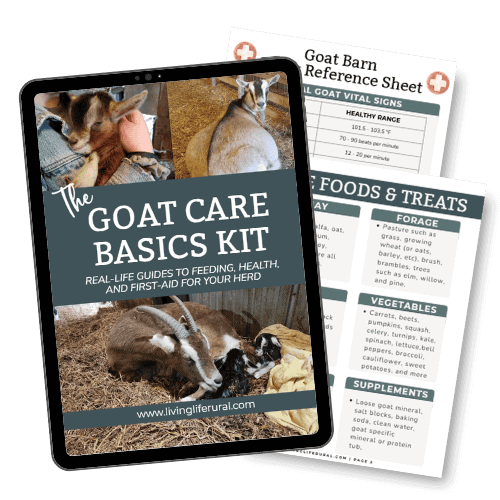
Can Goats Eat Grapes?
Grapes are another safe and enjoyable fruit for goats. They’re packed with antioxidants and can make for a fun treat. The key here is moderation. Grapes are high in sugar, so too much of a good thing could upset your goat's digestion, so offer them sparingly.
Can Goats Eat Bananas?
Bananas are a hit among many goat herds, and for good reason! This soft, sweet fruit is rich in potassium, vitamin B6, and fiber, which can provide a gentle energy boost. I’ve found bananas are especially appreciated during winter months when fresh browsing options are limited. Just peel, slice, and offer them as a quick snack.
Bananas, with their soft texture, also make a great option for dispensing medications to your goats if necessary. You can wrap up a pill quite easily in a banana.
Can Goats Eat Banana Peels?
Yes, goats can eat banana peels, though not all goats will have a taste for them. The peels are safe and contain additional fiber and nutrients. However, be cautious if you're unsure about pesticide residues.
Pro tip: thoroughly wash the peel to remove any lingering chemicals, or better yet, stick to organic bananas when offering the peels.

Can Goats Eat Strawberries?
Strawberries? Oh, absolutely! They are probably one of my goats favorite treats. These juicy berries make excellent treats for goats, providing antioxidants and a burst of vitamin C. Since strawberries are small and easy to chew, they don’t require much prep—just a quick rinse, and they’re ready to feed. One note of caution: strawberries are higher in water content, so keep servings small to avoid digestive issues.
As a note, most common other berries are safe for goats as well such as blueberries, raspberries, and blackberries.
Can Goats Eat Squash?
Squash might not seem like fruit, but it's technically classified as one—so let’s include it here. Goats can safely munch on various types of squash, including zucchini and pumpkins. These are packed with vitamins and provide a different texture for your goats to explore. To prepare squash for your herd, cut it into smaller pieces and remove the seeds, which can be tough for them to digest.
By giving your goats plenty of variety and keeping these treats in check, you’re setting them up for happy, healthy grazing sessions. Remember, fruits should only ever be a complement to a goat's main diet of hay, pasture, and high-quality feed. Keep experimenting, and you'll quickly learn which fruits your goats love the most!
What Vegetables Can Goats Eat?
Beyond hay, pasture, and grains, vegetables can play a supporting role in a goat's overall nutrition. They provide a variety of nutrients and can double as occasional treats, provided you stick to those that are safe. Let’s explore a few common vegetables and how they fit into a goat's diet.
Can Goats Eat Carrots?
Yes, goats can eat carrots, and most of them find the crunch irresistible! Carrots are packed with beta-carotene, which converts to vitamin A in the body—essential for maintaining healthy skin, eyesight, and immune function. It’s up to you whether you offer them chopped, shredded, or straight out of the garden. While they're a great snack, remember that moderation is key. (ya, I know I sound like a broken record, but it's important to remember!) Too many carrots (or any treat) can upset your goat’s digestion
Give it a try: Slice up a couple of carrots and mix them into your goat’s usual feed. You’ll likely notice them eagerly diving in to enjoy the treat.
Can Goats Eat Bell Peppers?
Absolutely! Goats can safely eat bell peppers in any color—red, yellow, green, purple, or orange. These bright veggies are a great source of vitamin C, which helps boost their immune system, especially during colder months when fresh grazing is scarce. Just remove the seeds and stem before serving, as the seeds can be a little tough to digest.
Make sure to not feed them the plants or leave of the bell pepper though as those can be toxic to them.
If your goats are picky (we all have that one goat, lol), try cutting the peppers into smaller pieces or mixing them with other favorite snacks.
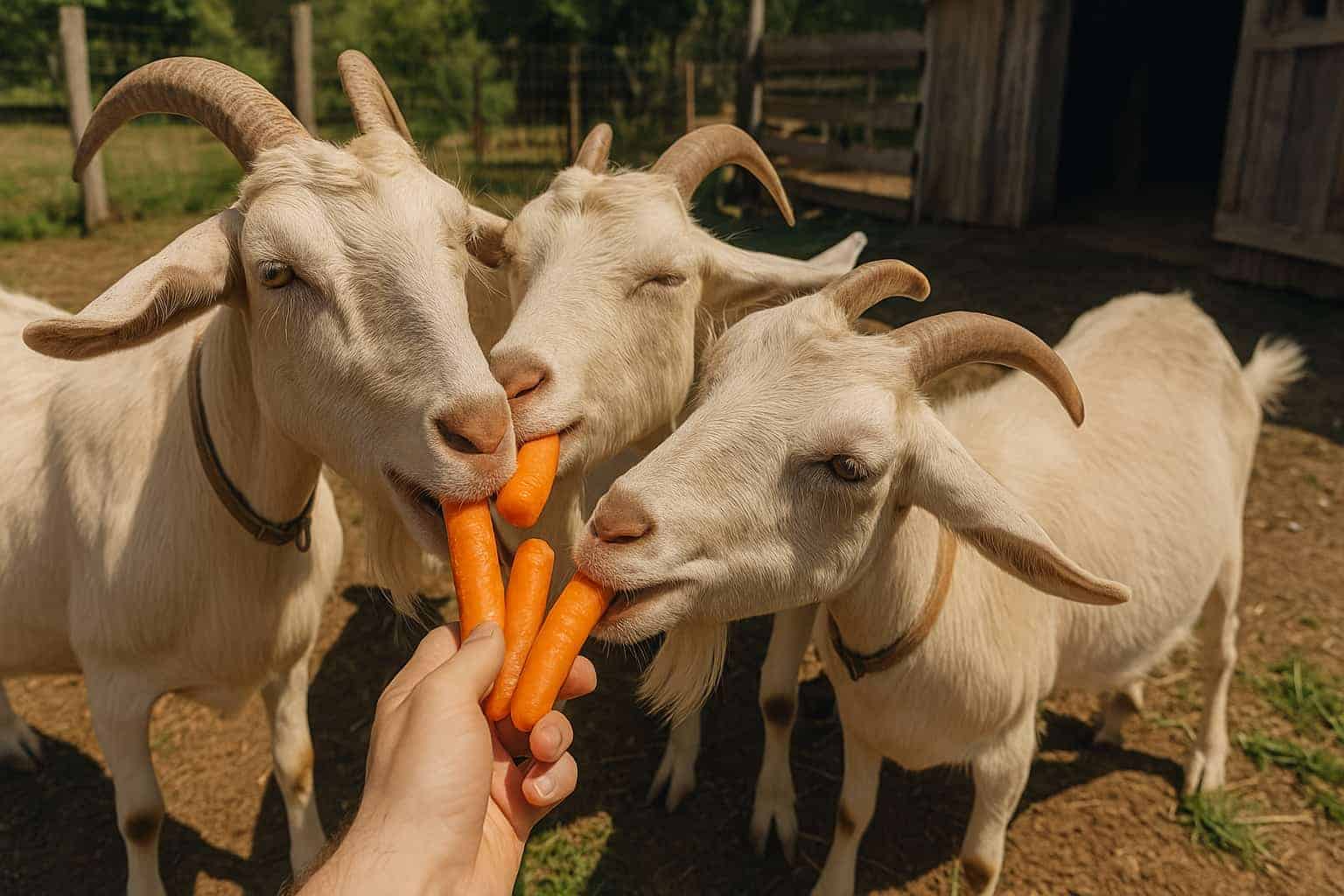
Can Goats Eat Beets?
Yes, beets are another nutritious option for goats. Both the leafy tops and the root itself are great for their diet. Packed with iron, potassium, and vitamins, beets can support overall health and help prevent anemia. The natural sugars in beets can also provide an energy boost, though, as with carrots, it's important to feed them sparingly to avoid overloading on sugar. Try offering raw, cubed beets or toss the leaves into their feed. You’ll be surprised how quickly they devour them.
Can Goats Eat Broccoli?
Broccoli is safe for goats, and many will enjoy nibbling on it. It's loaded with vitamin K, folate, and calcium, which contribute to strong bones and healthy blood clotting. However, broccoli can cause gas if eaten in excess, so start with small amounts and observe your goat’s reaction. You can serve it raw, including the stalks and florets. Just avoid cooked and seasoned broccoli—stick to the natural stuff!
Can Goats Eat Cauliflower?
Goats can eat cauliflower too, though it’s less common as a go-to snack. This vegetable offers fiber and vitamin C in abundance. Introduce cauliflower gradually and in small portions to avoid potential bloating or digestive discomfort. You can feed goats both the florets and the leaves, making it a more sustainable option when using leftover garden scraps.
Can Goats Eat Lettuce?
Lettuce can be a refreshing addition to a goat’s diet, particularly during the hotter months. Varieties like romaine and green leaf are the best choices due to their nutrient content. Iceberg lettuce, while safe, has little nutritional value and should only be given occasionally. Chop it up and toss it into their feed for a hydrating snack, but don’t overdo it—lettuce's high water content can cause diarrhea if consumed in large amounts.
Can Goats Eat Spinach?
Spinach is another nutrient-rich option that goats can handle in moderation. It’s full of iron, calcium, and vitamins, making it a great occasional treat. However, spinach also contains oxalates, which can interfere with calcium absorption if eaten frequently. Think of spinach as a bonus snack rather than a menu staple. Offer a handful every now and then, and your goats will likely munch it down with enthusiasm.
Can Goats Eat Sweet Potatoes?
Sweet potatoes are a fantastic treat for goats! They’re rich in vitamins A and C, as well as dietary fiber. To prepare them, cut the sweet potatoes into small slices or chunks, or serve them cooked if you want a softer option. Avoid feeding raw peels, though—they’re tough to digest and could potentially upset your goat’s stomach.
Sweet potatoes not only provide nutrition but also offer a fun texture variety for your herd.
Can Goats Eat Cabbage?
Cabbage is generally safe for goats but should be offered cautiously. While it provides vitamins K, C, and fiber, it is another veggie that can cause gas buildup if overfed. Chop it into smaller pieces and blend it into other foods to keep portions in check. As always, monitor your goats after introducing cabbage to avoid any tummy troubles.
Can Goats Have Zucchini?
Yes! Zucchini is highly goat-friendly. Its soft texture makes it easy for them to eat, and it’s full of water, fiber, and vitamins. You can feed zucchini raw or cooked, though it’s best to skip any seasoning. Both the flesh and skin are safe, so feel free to serve them whole or chopped.
Zucchini also makes an excellent addition to your gardening supply of homegrown snacks—why not let your goats reap the benefits of your harvest along with you?
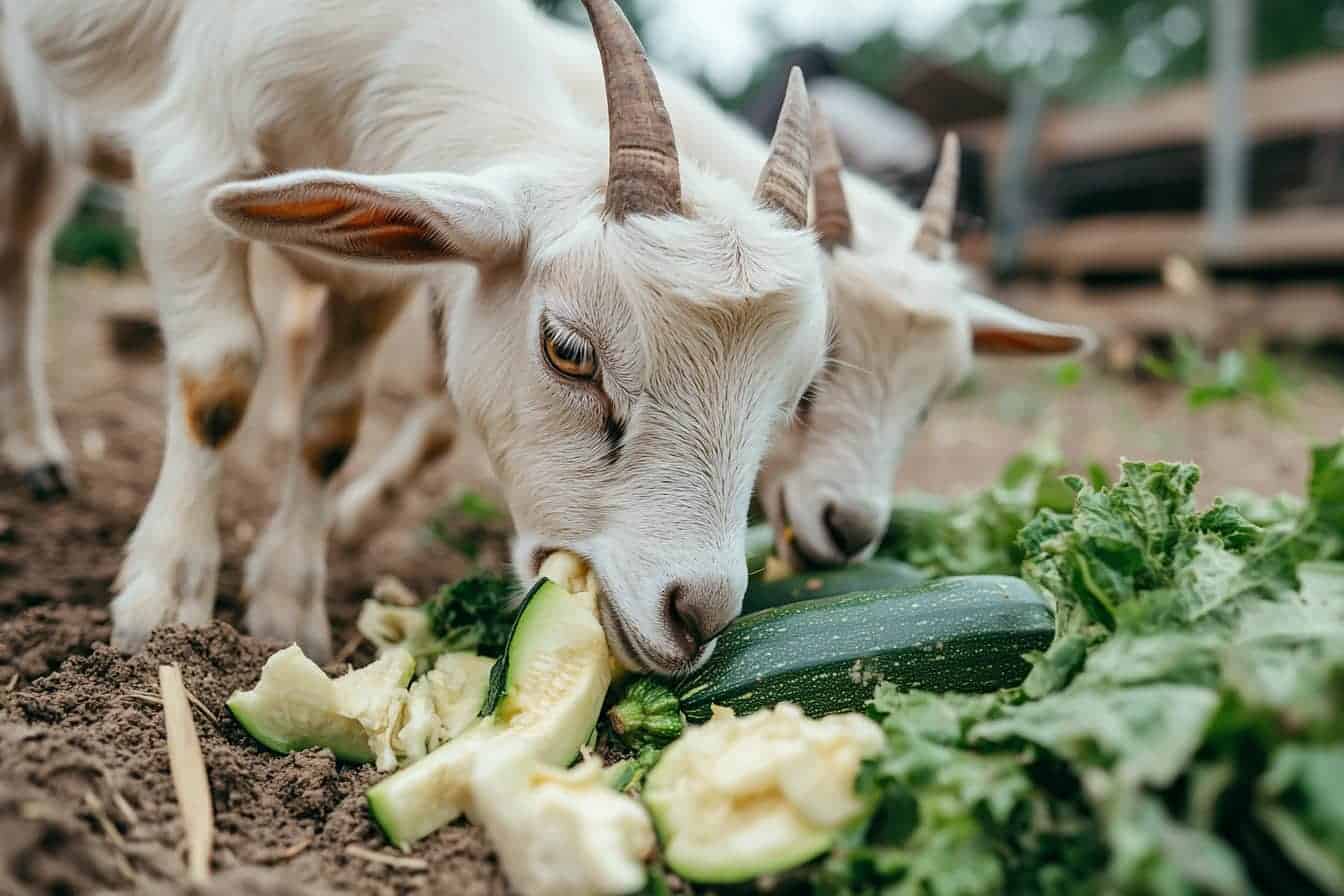
Other Foods and Treats for Goats
Goats may be curious eaters, but it's important to know what’s safe and nutritious before offering them new foods. Let’s take a closer look at common treats and some lesser-discussed foods that you might be wondering about.
Can Goats Eat Tomato Plants?
Tomato plants can pose serious risks to your goats. While the ripe fruit itself is safe and often enjoyed in moderation, the leaves and stems contain solanine, a compound that's toxic to goats. Even small amounts can result in upset stomachs, diarrhea, or worse.
If you have a garden with tomatoes, it’s best to keep your goats away from the plants entirely. Curious noses can quickly lead to unintended munching, so consider fencing your garden or creating a barrier. For more on identifying toxic plants for goats, check out this guide on goats and poisonous plants. Remember, prevention is always better than treating an avoidable health issue.
Can Goats Eat Wheat?
This might seem like a silly question since wheat is a grain, right? Wheat can be integrated into a goat’s diet, but it’s not a staple food. Goats thrive best on forage such as hay, grass, and browse. Wheat, however, can be used as a supplement or treat. It’s important to offer it in a cracked or rolled form, as whole wheat is hard for goats to chew and digest effectively.
Too much wheat can upset the balance of their rumen (stomach), leading to bloating or other digestive issues. Aim to offer it as a small, occasional addition to their primary feeding routine. Always pair grains with plenty of fresh water to ensure smooth digestion.
Can Goats Have Corn Husks?
Good news: corn husks are safe for goats! They make for a crunchy, fibrous addition to their diet. Not only are they safe, but they’re also fairly nutritious, containing fiber, small amounts of protein, and essential nutrients that goats can benefit from. That said, corn husks should still be offered in moderation.
Goats tend to enjoy the texture, and you might notice them munching away enthusiastically. Consider mixing corn husks with other vegetable scraps for a fun combination treat.
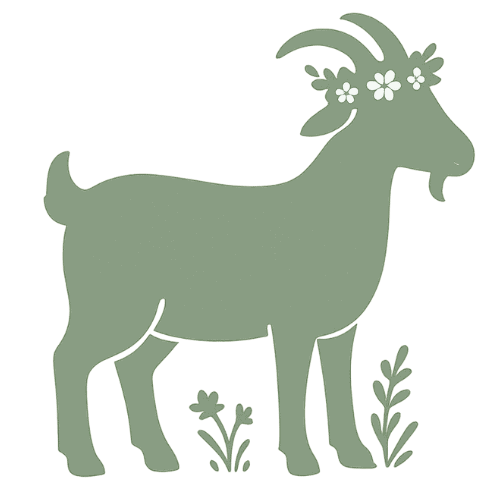
Hey There! Come Join the Conversation!
If you’re looking for a welcoming space to ask questions, swap homestead tips, or just share what’s going on in your garden or barnyard, I’d love for you join our Modern Homesteading for Beginners Facebook group!
Can Goats Eat Bread?
Ah, bread—it’s definitely popular with goats, but it should be treated like the equivalent of candy for them. Bread is safe to feed in small quantities, but it’s primarily a carbohydrate-heavy food with minimal nutritional value. It’s best used as an occasional treat rather than a regular feed option.
When offering bread, stick to plain varieties without added sugars, preservatives, or flavorings such as garlic and onion (which are toxic). Break the bread into bite-sized pieces to avoid choking risks. Remember, too much bread can lead to bloating or disrupt the balance of your goat’s digestive system. Moderation is always the key to avoiding trouble.
Bread is also another great option for delivering oral medication to your goats. You can even add a little peanut butter to make sure the medicine sticks on the way down.
Other Common Treats
Crackers, animal crackers, and graham crackers all make great ocassional treats for your goats as well. One my goats favorites are plain animal crackers, and thankfully they are an inexpensive treat.
You can find various “goat treats” in the goat feed section of your local supply stores usually as well. These make great options as they are usually a more balanced treat for your goats.
By tailoring treats like these to your goat’s diet, you can keep them both happy and healthy. Always start with small amounts when introducing new foods and closely monitor their reactions. After all, understanding and testing safe options is part of the fun of raising goats!
Foods to Avoid
Not everything your goats encounter is safe to eat—in fact, some foods and plants can seriously harm their health. Understanding what to avoid is just as important as knowing what to feed them.
Toxic Plants Goats Should Avoid
Did you know that even just a bite of certain plants could spell trouble for your goats? Plants like azaleas, rhododendrons, and oleanders are highly toxic and should never be anywhere near your herd. These plants contain compounds that can lead to severe digestive upset, heart issues, or worse.
Another one to watch out for? Rhubarb leaves. While you might enjoy rhubarb pie, the leaves of this plant contain oxalic acid, which is poisonous to goats. If you grow any of these plants in your yard or garden, keeping them fenced off is a great idea.
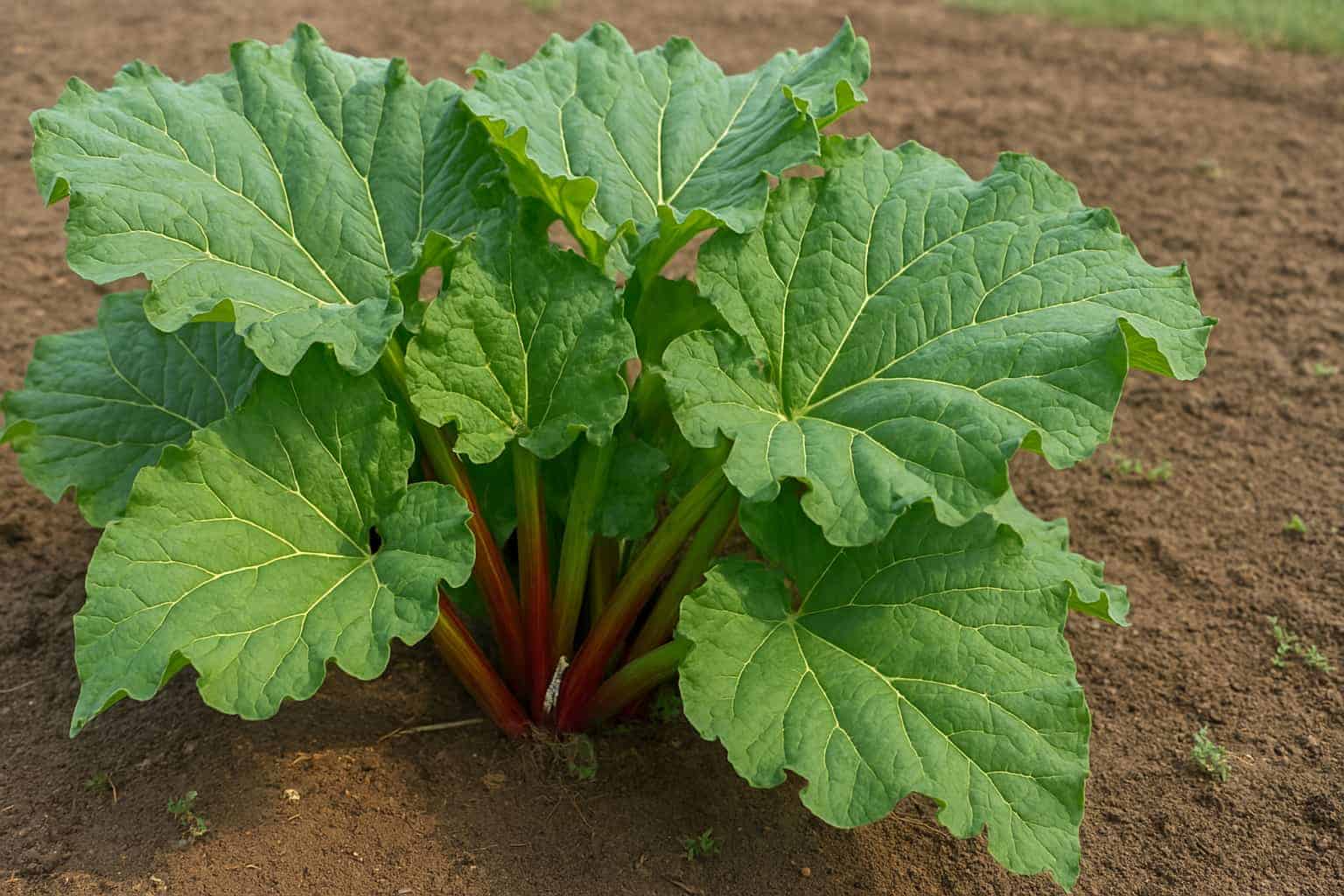
Moldy or Spoiled Foods
While goats may seem like they'll eat “anything,” spoiled or moldy foods are a major no-go. Mold can harbor harmful toxins (like mycotoxins) that disrupt their digestion and can even lead to poisoning. This includes moldy bread, hay, fruit, or vegetables.
It might be tempting to toss table scraps their way, but proceed with caution. Anything past its prime should head to the compost pile, not the goat pen.
Foods High in Sugar or Caffeine
Sugary foods like candy or baked goods might feel like harmless rewards, but they can wreak havoc on a goat's digestive system. Goats thrive on hay, grains, and pasture—not desserts. And caffeine? Definitely a no. Caffeine, found in chocolate, coffee, and tea, is toxic to goats and can cause heart and stomach problems.
Citrus Fruits
Citrus fruits (oranges, lemons, limes, etc) should just be avoided in general. The peels are bitter and not something your goats are likely to love, and eating too much citrus can upset their rumen pH due to the acidity.
Vegetables That Should Be Limited
Not all vegetables are equal when it comes to goats. For example, nightshade family members like tomato plants (the stems and leaves, not the fruit) contain solanine, a harmful toxin. Also, avoid raw potatoes, as they're hard for goats to digest and may cause stomach upset.
Garlic and onions are another pair to watch out for. These alliums can damage red blood cells in goats, leading to anemia. Here's a detailed guide on goat diets to keep your herd safe.
Salty and Processed Foods
Salty or processed snacks aren’t just bad—they’re potentially deadly. Foods high in salt can lead to dehydration or mineral imbalances. Packaged and processed human foods often contain preservatives that have no place in your goat's diet.
Reminder: Always Observe and Learn
Whenever you introduce something new to your herd, keep an eye out for unusual reactions—diarrhea, less energy, or reduced appetite. Prevention is always easier than cure. A thoughtful approach adds years of health and happiness to your goats’ lives!
FAQ's
Which Snack Do Your Goats Love?
Keeping your goats happy and healthy starts with understanding their dietary needs. Offering a balanced mix of safe, nutritious foods while steering clear of harmful options is essential for their overall well-being.
Take the time to research new treats before introducing them into your goat’s routine. This approach can save you a lot of trouble down the road and help your goats thrive.
What’s one treat your goats absolutely love? Let us know and share your go-to feeding practices!